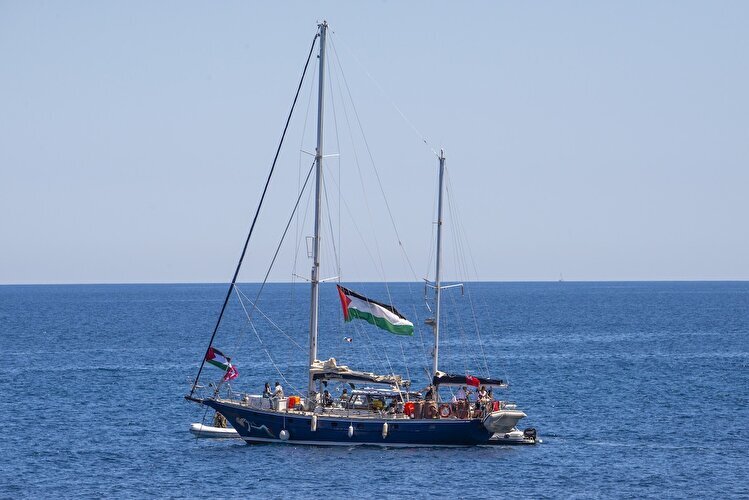Israel Under Siege by the Sumud Flotilla
TEHRAN (Defapress) - The International Fleet of Resilience (Sumud), which had set sail on Sunday to deliver humanitarian aid to the people of Gaza, was forced to turn back due to adverse weather conditions. The organizers announced in a statement that this decision was made due to strong winds with speeds exceeding 30 knots (equivalent to 55 km/h), and they are currently reevaluating to decide on a new time to set sail for Gaza.

The first wave of the Resilience (Sumud) Flotilla consists of dozens of ships and, after departing from the port of Barcelona, will join another wave of ships in Tunisia. This is the largest maritime aid operation to Gaza, bringing together activists from 44 countries on more than 50 ships. According to the Global Sumud Fleet, this coalition includes a wide range of individuals, including organizers, aid workers, doctors, artists, religious figures, lawyers, and sailors, united to end the blockade and genocide in Gaza.
Organizational Structure of the Sumud Flotilla
According to officials of the Global Sumud Fleet, delegations from 6 continents and countries such as Australia, Brazil, South Africa, and several European countries are participating in the large operation to break the siege of Gaza. However, the participants have no governmental or partisan affiliations.
This operation is organized by four major groups, all of which have played significant roles in previous aid operations to Gaza:
1. The Global Movement Towards Gaza, which organizes global popular actions for solidarity and support with Gaza.
2. The Freedom Flotilla Coalition, with 15 years of experience in carrying out maritime missions, including organizing flotillas such as the "Madelin" and "Handala". This coalition is responsible for advisory, guidance, and operational support for the current operation.
3. The Sumud Flotilla Maghreb, which is tasked with organizing aid for the people of Gaza in North Africa.
4. Sumud Nusantara, a popular movement in Malaysia and eight other countries that works to break the siege of Gaza and strengthen solidarity among Global South countries.
The coalition formed by this quadrilateral alliance constitutes the largest civilian aid flotilla in history overall.
A strategic committee consisting of figures such as Greta Thunberg (Swedish activist), Kleoniki Alexopoulou (historian), Yasemin Acar (human rights activist), Thiago Ávila (socio-environmental activist), Melanie Schweizer (political scientist and lawyer), Karen Monaghan (social scientist), Maria Elena Delia (physicist), Saif Abukeshek (Palestinian activist), Muhammad Nadir al-Nuri (aid worker), Marouan Ben Guettaia (civil activist), Wael Nawar (civil activist), Hayfa Mansouri (activist and social researcher), and Torkia Chaibi (human rights activist) is responsible for managing this fleet. In addition to the hundreds of people who will be on the ships, tens of thousands of other volunteers have registered to participate.
Time of Departure Shrouded in Uncertainty
Saif Abukeshek announced during a press conference in Barcelona that the names of the ports of origin and the number of ships and passengers will not be disclosed at this time for security reasons. However, the 3,000-kilometer journey to Gaza will take 7 to 8 days.
Palestinian supporters have previously attempted to break the siege of Gaza by sending maritime aid, with varying results. In 2008, two boats from the Free Gaza Movement broke the Israeli blockade and successfully reached the coast of the Strip. This movement, established during Israel's 33-day war against Lebanon, launched 31 boats between 2008 and 2016, 5 of which reached Gaza despite severe Israeli restrictions. From 2010 onwards, all ships that attempted to break the Gaza blockade were intercepted or attacked by Israel in international waters.
· 2010 – Gaza Freedom Flotilla: Israeli commandos attacked the Mavi Marmara ship in international waters, killing 10 passengers and wounding dozens more, sparking global public outrage. The ship was carrying humanitarian aid and had over 600 passengers.
· 2011 – Freedom Flotilla II: This flotilla was organized to continue the 2010 operation to break the Gaza blockade and deliver aid, but it was intercepted.
· 2015 – Freedom Flotilla III: This flotilla, led by the Swedish ship "Marianne of Gothenburg," was the third major attempt by international activists to break the naval blockade of Gaza and was stopped by Israel.
· 2018 – Just Future for Palestine Flotilla: This flotilla was part of the ongoing efforts by the Freedom Flotilla Coalition to challenge the naval blockade of Gaza.
· 2025 – Flotilla of Conscience: This flotilla was hit twice by Israeli drones 25 kilometers off the coast of Malta. The attack caused a fire and a large breach in the ship's hull, endangering the lives of 30 Turkish and Azerbaijani activists.
· 2025 – Madelin: This ship, launched this year by the Freedom Flotilla Coalition, was intercepted by the Israeli military 185 kilometers from Gaza in international waters.
· 2025 – Handala (Hanzala): Israel stormed this ship in Bahman 1403 (January/February 2025).
Israel has imposed a strict blockade on Gaza's airspace and territorial waters since 2007. Gaza's international airport was bombed three years after its inauguration in 2001, and the Strip has no active airport. By sending aid via the sea route, the Sumud Flotilla intends to directly challenge the Israeli blockade.
